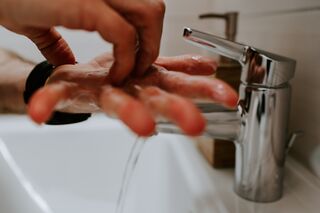OCD
Why Having OCD Does Not Prepare You for COVID-19
No, I haven't been training for this moment for years.
Posted November 1, 2020 Reviewed by Abigail Fagan

I’ve recently found myself on the receiving end of a rather strange line of questioning. It usually starts like this: “Does having OCD mean you’re really prepared for COVID-19?” “Have you been training for this moment for years?” “Do you love how everyone’s finally washing their hands a lot?” By this point, my blood pressure is rising and I’m struggling to find a way to explain that no, just like you, I'm not having much fun either.
Firstly, and contrary to public stereotypes, OCD is not always related to contamination and a fear of germs. The person with OCD you’re talking to might not be any more concerned about germs and cleanliness than you. Their OCD might take the form of something completely different, such as obsessively worrying they’ve hit a pedestrian in their car and don’t remember it, and compulsively driving around the block for hours to check they didn’t.
However, even if they do have genuine obsessions and compulsions around contamination, I can assure you that no, they don’t find their condition "helps" them manage or fight COVID-19, nor are they secretly pleased that the whole world is washing their hands more than ever before. And I should know; fears around contamination were a central part of my OCD for years.
When you live your life constantly worrying that you, an object, your house or whatever else, are unclean to the extent that you have diagnosable OCD, you have reached the stage where your cleaning habits are dysfunctional. This word is key. To anyone who has seen or experienced the utter devastation of a life spent entwined with contamination compulsions, you may feel I am labouring this point. But take an article published in the Wall Street Journal back in March during the first wave of COVID-19. Headlined "We All Need OCD Now" the article, written by Stanford University psychiatrist Elias Aboujaoude, suggested that we could look to an OCD patient of his for "discipline" and "inspiration." The article, which received condemnation from several OCD charities, concluded: "A little OCD, right now, wouldn’t be so bad," as if OCD were a dimmer switch one could dial up or down at will.
In some ways, it feels like many people at the moment see people with contamination OCD as a group of wise prophets who were ahead of their time, or sparkling superheroes brandishing sanitizer and bottles of bleach. But for those of us who actually know what contamination OCD is like, this is very far from the reality. We can’t help you navigate this crisis, because when we are ill, we can’t help ourselves. Our compulsions do not follow rationality or reason, so there is no way to usefully or practically apply them to an actual threat.
To come back to the dysfunctional nature of OCD: When I was very unwell, I washed my hands hundreds of times a day. I have permanent skin damage from the harsh chemicals I inflicted on my skin. Recovering from OCD involves challenging compulsions and seeing what happens. For me that involved practicing going hours, or even days, without washing my hands. In the end, it was a proud moment when I committed to not having sanitizer on me anymore. Before COVID-19, I hadn’t carried sanitizer on me for over five years. As a recovering alcoholic may hope to no longer carry alcohol on them, recognising their dependency and unhealthy relationship with it, I actively chose to no longer carry sanitizer on me. So you see, thinking I’m "extra-specially prepared" for the pandemic, is a bit like expecting an alcoholic to be "extra great" at navigating an occasion where alcohol is typically drunk, like Christmas or New Year’s Eve, which I say as someone who has had their fair share of issues with alcohol. Far from feeling prepared or especially equipped, I just don’t know when to stop.
I'm proud of how I've coped, but that doesn't change the fact that not relapsing into the cleaning rituals that previously dominated my life is a daily battle, because compulsive behavioural patterns do not equal expertise. The reality is it’s the opposite way around.


